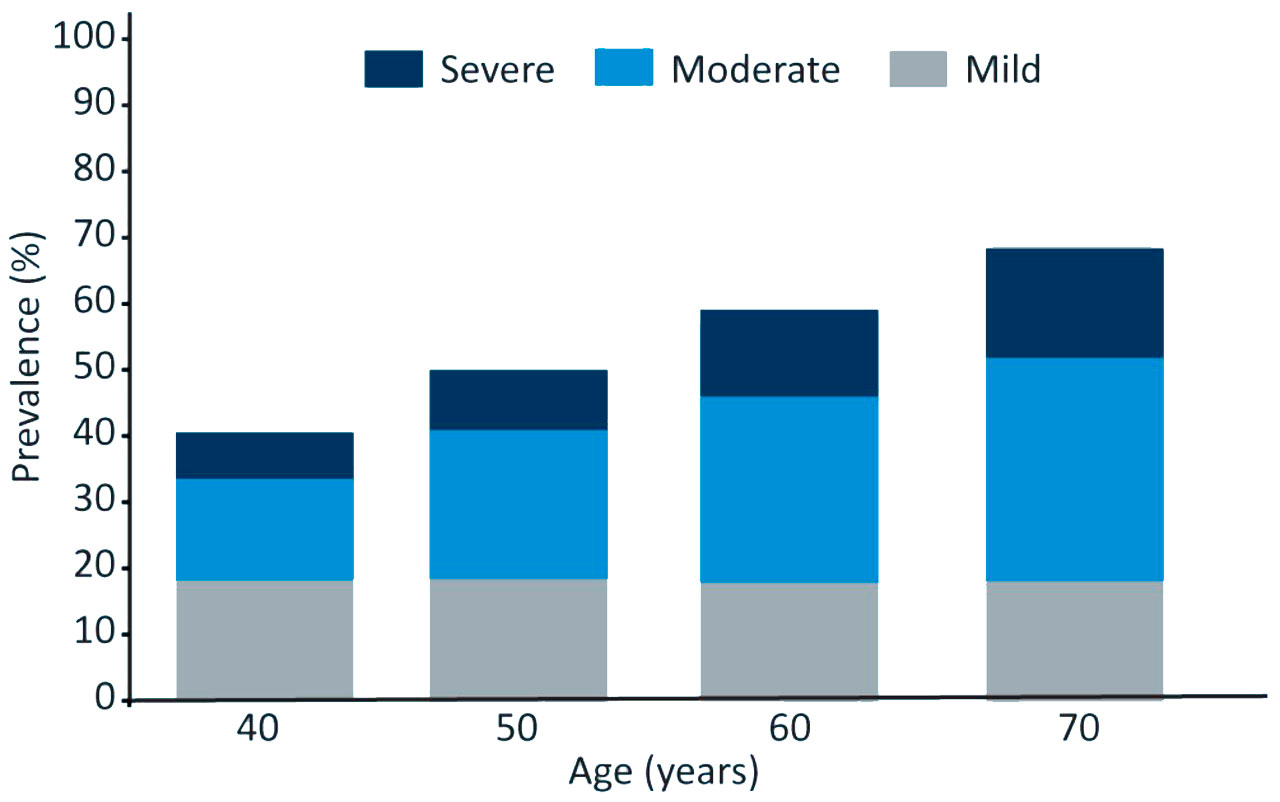Erectile Dysfunction
What is erectile dysfunction?
Erectile dysfunction (also called "impotence") is the inability to achieve or maintain an erection with sufficient firmness to have sexual intercourse.
Although it is normal to occur sporadically, it is considered a problem when it occurs continuously, affecting the patient’s sexual life.
The vast majority of cases of erectile dysfunction are of physical origin, therefore their occurrence may be symptom of another undiagnosed condition.
The best way to deal with this problem is to consult a doctor. It is a very common condition, with a wide range of effective treatments.
Massachusetts Male Ageing Study
MMAS is the largest study on male sexual health to date. Here are some of his conclusions about erectile dysfunction:

A very common problem
52% of men aged 40 to 70 showed some degree of erectile dysfunction.
The degree of complete impotence is tripled from 5% to 15% among men aged 40 to 70.
Source: Massachusetts Male Ageing Study
Symptoms
• Persistent difficulty in achieving erection.
• Erection is weaker or less rigid.
• Spontaneous erections in the morning are less frequent.
• Climaxes are reached in less time or with an incomplete erection.
• Loss of sexual desire.
Symptoms
• Persistent difficulty in achieving erection.
• Erection is weaker or less rigid.
• Spontaneous erections in the morning are less frequent.
• Climaxes are reached in less time or with an incomplete erection.
• Loss of sexual desire.

Causes
Male sexual activity is a complex process involving psychological and physical factors. Occasionally, erectile dysfunction can occur by a combination of both.
Psychological causes
Approximately 10% of cases are due to psychological causes that include worry and/or guilt around sexual encounters, anxiety and relationship problems.
Physical causes
In almost 90% of cases the causes are organic or physical, mostly related to poor blood circulation, called "vascular insufficiency".
Vascular failure is often associated with a number of conditions, including:
Diabetes, high cholesterol, hypertension, heart conditions, use of certain drugs, stress and/or depression, prostate treatments and alcohol, tobacco and drug abuse.

Erectile disfunction treatment
Erectile dysfunction is a set of symptoms with multiple causes. Elexial has developed a holistic view, which considers all aspects of the problem.
In the first consultation we evaluate what each patient is looking for and their treatment expectations. Some prefer quick solutions for symptoms and others a deeper treatment aimed at the root of the problem.
We combine this with the results of the medical evaluation to establish a joint work process.
Erectile disfunction treatment
Erectile dysfunction is a set of symptoms with multiple causes. Elexial has developed a holistic view, which considers all aspects of the problem.
In the first consultation we evaluate what each patient is looking for and their treatment expectations. Some prefer quick solutions for symptoms and others a deeper treatment aimed at the root of the problem.
We combine this with the results of the medical evaluation to establish a joint work process.
Comprehensive and multidisciplinary treatment
Depending on the situation of each patient, treatment may include the following:
• Visits to the specialist to treat possible associated pathologies.
• Combination of personalized drugs for each patient.
• Use of low focal energy shock wave technology, which works by improving and regenerating tissues.
• Assessment and psychotherapeutic support, clinical sexology and sexual counselling.
• Support to improve the patient’s lifestyle, including nutritional assessment.
Comprehensive and multidisciplinary treatment
Depending on the situation of each patient, treatment may include the following:
• Visits to the specialist to treat possible associated pathologies.
• Combination of personalized drugs for each patient.
• Use of low focal energy shock wave technology, which works by improving and regenerating tissues.
• Assessment and psychotherapeutic support, clinical sexology and sexual counselling.
• Support to improve the patient’s lifestyle, including nutritional assessment.
Treatment goals
• Allow the patient to have a hard enough erection to continue or restart their sex life in a satisfactory manner.
• Maintain levels of oxygenation and circulation in tissues to rehabilitate erectile tissue and prevent a process of atrophy from occurring or perpetuating.
• Lead to patients requiring or being able to discontinue doses of recommended medications over time.
A widespread problem
71% of our patients have difficulty getting or maintaining an erection.
Source: Data from Boston Medical Group’s internal tracking program, 2010–2018.
Adjacent diseases
25% of our patients suffer from hypertension.
22% suffer from disorders of lipoprotein metabolism and other lipidemias.
20% have diabetes.
Source: Data from Boston Medical Group’s internal tracking program, 2010–2018.

Results
95% of our patients enjoy their sex lives.
Source: Data from Boston Medical Group’s internal tracking program, 2010–2018.
Treatment goals
• Allow the patient to have a hard enough erection to continue or restart their sex life in a satisfactory manner.
• Maintain levels of oxygenation and circulation in tissues to rehabilitate erectile tissue and prevent a process of atrophy from occurring or perpetuating.
• Lead to patients requiring or being able to discontinue doses of recommended medications over time.
Need Help?
1. Make an appoinment
Make an appointment by calling xxx xxx xxx or through the form.
2. Go to the appointment
A doctor will receive you at the nearest clinic or by video consultation, depending on the option chosen.
3. Diagnosis
At the first consultation, you will receive a diagnosis and treatment personalized to your needs and expectations.

